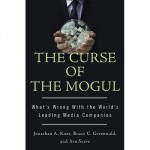The October issue of The Atlantic gives us a chapter from a forthcoming book that, at the very least, has some eye-popping blurbs from marquee names. It’s The Curse of the Mogul: What’s Wrong with the World’s Leading Media Companies, and among the raves available on its Amazon page are recommendations from James B. Stewart, Sylvia Nasar, and Joseph Stieglitz.
Due to be published Oct. 15, the book is the work of two Columbia professors and a consultant who say that the media industry’s current fix shouldn’t be blamed on the Internet and Craig Newmark; nor can it simply be laid at the door of newspaper editorial boards that endorsed Republican candidates, entertaining Michael Moore rants on YouTube notwithstanding. Instead, they set out to demonstrate that media companies “generate consistently bad financial results” because of their ongoing strategic failures.
The Atlantic’s excerpt focuses on four specific bad strategies:
“Executives, investors, analysts, and the press seem to agree that the primary imperatives are to accelerate growth, diversify internationally, invest in content, and exploit digital convergence. Unfortunately, these are precisely the strategies that media companies pursued aggressively during the past lackluster decade. Understanding the fundamental flaws of these four tenets of conventional media wisdom—growth, globalization, content, and convergence—is essential to saving media shareholders of the future from the anemic returns of their predecessors.”
(Hmm, are we ready to predict that there actually will be “media shareholders of the future”? Well, leaving that aside….)

Ever notice how book covers generally can't be as entertaining as magazine illustrations? Especially illustrations of strategic visionaries.
Of course they had me at hello, given that they started with the AOL-Time Warner deal (and you know what I thought about that). Newspapers are largely missing from the excerpt – News Corp. is there, but Rupert is treated better in the text than in the Atlantic’s illustration (above). Nevertheless, it’s perfectly fine to generalize when the authors argue that no matter who coined the phrase, content is not and cannot be king.
“But content cannot be king, because the talent required to create it cannot provide a sustainable competitive advantage….It is no coincidence that Google, the most profitable and successful new media company, is an aggregator, not a content creator.”
Sometimes the authors have fun with the obvious, other times they are obviously having fun (from a section debunking the value of convergence, a myth dear to the hearts if not the pocketbooks of ex-Tribune Co. types: “Whenever someone suggests to you that breaking down barriers to entry is good news, hold tight to your wallet”), it’s going to be not-put-down-able.
Which is the opposite of what the authors are saying about the moguls.

